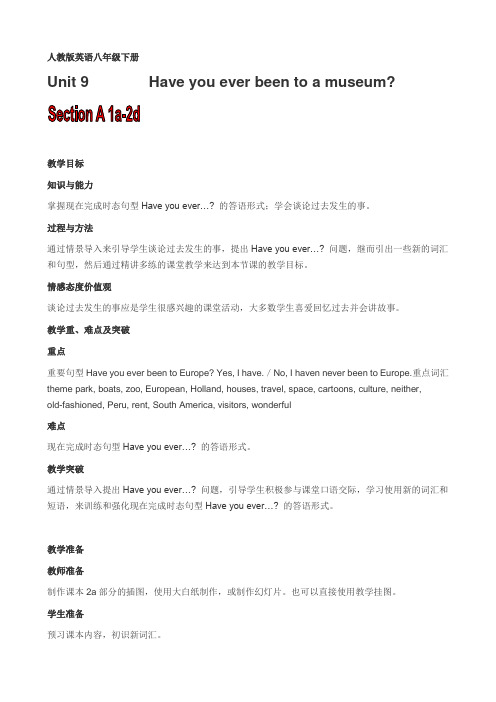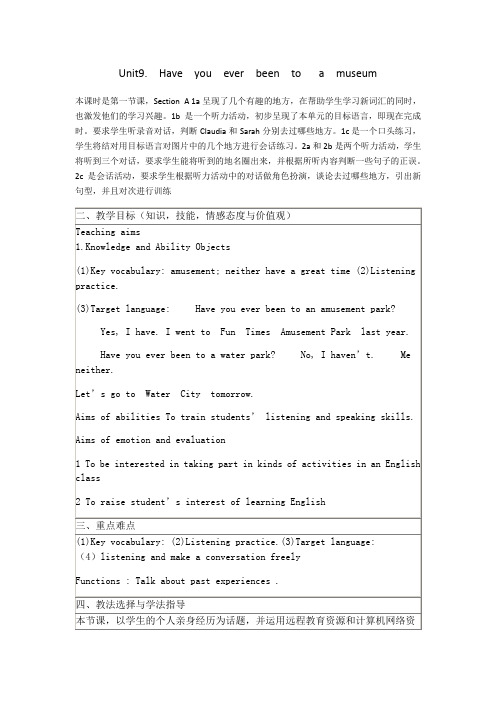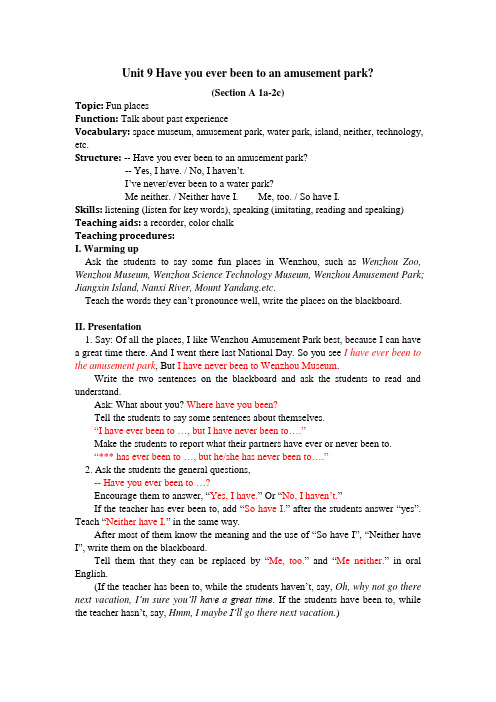2013年人教版八年级英语下《Unit9 Have you ever been to an amusement park》课件2
英语人教版八年级下册Unit 9 Have you ever be

人教版英语八年级下册Unit 9 Have you ever been to a museum?教学目标知识与能力掌握现在完成时态句型Have you ever…? 的答语形式;学会谈论过去发生的事。
过程与方法通过情景导入来引导学生谈论过去发生的事,提出Have you ever…? 问题,继而引出一些新的词汇和句型,然后通过精讲多练的课堂教学来达到本节课的教学目标。
情感态度价值观谈论过去发生的事应是学生很感兴趣的课堂活动,大多数学生喜爱回忆过去并会讲故事。
教学重、难点及突破重点重要句型Have you ever been to Europe? Yes, I have./No, I haven never been to Europe.重点词汇theme park, boats, zoo, European, Holland, houses, travel, space, cartoons, culture, neither,old-fashioned, Peru, rent, South America, visitors, wonderful难点现在完成时态句型Have you ever…? 的答语形式。
教学突破通过情景导入提出Have you ever…? 问题,引导学生积极参与课堂口语交际,学习使用新的词汇和短语,来训练和强化现在完成时态句型Have you ever…? 的答语形式。
教学准备教师准备制作课本2a部分的插图,使用大白纸制作,或制作幻灯片。
也可以直接使用教学挂图。
学生准备预习课本内容,初识新词汇。
教学步骤(第1课时)第一课时教学流程设计教师指导1.情景导入谈论过去发生的事。
2.引导学生进行听力训练。
3.Pairwork小组活动。
学生活动1.谈论过去发生的事。
2.进行听力训练活动。
3.Pairwork小组活动:对话交流和问卷调查。
一、第一教学环节情景导入谈论过去发生的事(约分钟)二、第二教学环节听力训练活动(约分钟)三、第三教学环节Pairwork小组活动(约分钟)四、本课小结引导学生学习Have you ever…? 的答语形式和现在完成时态的用法。
初中英语人教版八年级下册Unit 9 Have you ever been to a

as…as
3)Communicative approach.
III.Sensibility and Value
To raise students’interest of learning English and love their country.
教
材
分
析
IV.Teaching Key Points
1.Key vocabulary:unbelievable, progress, rapid, unusual, toilet, encourage, social, peaceful, performance, perfect, itself, collect
Unit 9 Have you ever been to a museum?Section A 2 (3a-3c)
教
学
目
标
I. Knowledge and Ability Objects
1.Key vocabulary:unbelievable,progress,rapid, unusual,toilet,encourage,social,peaceful,perfect,
performance,itself,collect
2.Target language:
1)I wonder how much more computer will be able to do in the future.
2)Watching them prepare the tea with the beautiful tea sets is just as enjoyable as drinking the tea itself
初中英语人教版八年级下册Unit 9 Have you ever been to

Unit 9 Have you ever been to a museum?教学目标1.语言目标:掌握谈论过去经历及好玩地方的相关词汇。
2.技能目标:能听懂谈论过去经历的对话材料;通过听说训练,学会谈论好玩的地方;能写出重点单词和重点句型,并能描述旅游地方。
3.情感目标:通过本课的学习,让学生掌握主题公园和博物馆的英文名称,培养学生热爱祖国大好河山的精神。
教学重点句子:1.—Have you ever been to a science museum?—Yes,I have.I went to the National Science Museum last year.2.—I have never been camping. —Me neither.3.It also encourages governments and social groups to think about ways toimprove toilets in the future.4.—I have been to the art museum many times.—Me too.And I have also visited the nature museum.5.Have you visited the Palace Museum?6.Have you been to the Great Wall?7.You won’t have any problem getting rice,noodles or dumplings.教学难点1.能熟练掌握并使用have / has been to以及already,ever与yet的用法。
2.能够运用所学句型谈论过去的经历。
第一课时Section AStep 1 GreetingNice to meet you! Nice to meet you,tooWhat day is it today? It is Monday.What is the date today? It is Juan 12th.How are you? -------Step 2 Guide1.Revise the present perfectUse some pictures about Beijing Shanghai Guilin Nanning Guangzhou Wuzhou,and then ask the students to answer the teacher’s question,e.g:—Have you ever been to-----------?—Yes,I have.No, I haven’t.2.Look at the picture and learn the new words.Step3 PresentationGuess the places of the pictures; they are the British Museum, space museum, history museum, water park, zoo, amusement park while lead in sentence patterns:“ Have you ever been to …?”Get students to work in pairs to practice the conversatio n: “Have you ever been to…”“Yes, I have.”/ Not, I haven’t.Step4 Pre-listening1a.1.Please read the names of these places. (Teacher writes the names on the blackboard.) Which of these places would you like to visit? Rank them from 1 to 5.S4: Amusement park _____, water park _____, zoo _____ aquarium _____ space museum _____.S5: Space museum _____, aquarium _____, zoo _____, water park ____, amusement park _____S6: …2. Talk about the picture.Step 5 ListeningListen and choose the best answer. The first and the second question aim to listening to time, and the third one aims to listen for the relationship. This activity trains students’ listening ability for listening for specific relationship.1)When did Sarah visit the National Science Museum?A. Today.B. Yesterday.C. Last year.2)When did Claudia visit the nature museum?st year.B. Last summer.C. Last school trip.3)What may the relationship be between the two speakers?A. Friends.B. Teacher and student.C. Mother and kid.Keys: 1-3 CCAListen again. Listen and check the boxes. Have these students ever been to theseAsk and answer in pairs:A: L et’s go somewhere different today.B: OK. Where do you want to go?A: Have you ever been to the space museum?B: No, I haven’t. How a bout you?A: …Step7 Listening2a. Listen and circle the places that you hear.2b. Listen again and circle T for true or F for false.Conversation 11. Tina went to the space museum last year. T/F2. John has never been to the space museum. T/F3. They are going to take the subway. T/FConversation 21. Linda has been to the amusement park. T/F2. Linda went to the amusement park yesterday. T/F3. Linda is going to the amusement park again by bike. T/FConversation 31. Frank had a great time at the water park. T/F2. Frank’s friend has never been to the water park. T/F3. Frank and his friend are going skating. T/FKeys: TFT TFT FTTSpeakingLook at the map in 2a and make conversations about the places.A: Have you ever been to the space museum?B: Yes, I have. How about you?A: No, I haven’t.B: Oh, it’s fantastic. Let’s go tomorrow.A: OK. How are we going to get there?B: We can take the subway.SpeakingRole-play the conversation in 2d.A: I went to the film museum last weekend. Have you ever been there? …B: Yes, I have. I went there back in April. ……Step8 Language points1. I learned about the inventions that led to color movies, too. 我还了解了一些发明,它们成就了彩色电影。
英语人教版八年级下册Unit9. Have you ever been

Unit9. Have you ever been to a museum
本课时是第一节课,Section A 1a呈现了几个有趣的地方,在帮助学生学习新词汇的同时,也激发他们的学习兴趣。
1b是一个听力活动,初步呈现了本单元的目标语言,即现在完成时。
要求学生听录音对话,判断Claudia和Sarah分别去过哪些地方。
1c 是一个口头练习,学生将结对用目标语言对图片中的几个地方进行会话练习。
2a和2b是两个听力活动,学生将听到三个对话,要求学生能将听到的地名圈出来,并根据所听内容判断一些句子的正误。
2c是会话活动,要求学生根据听力活动中的对话做角色扮演,谈论去过哪些地方,引出新句型,并且对次进行训练。
新课标人教版八年级英语下册Unit 9 Have you ever been to an amuse

—So did Tina.
中国地图
蒂娜也去了。
—He has been a soldier for two years.
要点点拨
他已经当了两年兵了。
go inline skating 滑旱冰
—So have I.
我也是。
全析提示
3.Look at the map of the town.Listen and circle the places 助动词 have 和 has 可以与前面的
you hear.
主语缩略’ve 和’s。
看城镇的地图。听录音并圈出你听到的地方。
如:we’ve,they’ve,he’s,
water world 水上世界
it’s 等。
city library 城市图书馆
have not 常缩略为 haven’t,has
fun times amusement park
如果说“欢迎回家”该怎么说呢?
把 1a 中你的回答和你搭档的回答对照一下。
Wele back home!
4.For me,“I have to!” is number two.
对我来说“I have to!”是第二位的。
要点点拨
5.Listen to a teacher interview a student.Circle the newsletter 业务通讯;新闻信札
route“路线、小路、小巷”,使
The main attraction was a Charlie Chaplin film.
用 X 围也较小。course 表示船的
吸引人的主要是查理·卓别林的电影。
“航道”或飞机的“航线”。
The idea of being a teacher has little attraction to young
英语人教版八年级下册Unit 9 Have you ever been ...

Unit 9 Have you ever been to an amusement park?(Section A 1a-2c)Topic: Fun placesFunction: Talk about past experienceVocabulary: space museum, amusement park, water park, island, neither, technology, etc.Structure: -- Have you ever been to an amusement park?-- Yes, I have. / No, I haven’t.I’ve never/ever been to a water park?Me neither. / Neither have I. Me, too. / So have I.Skills: listening (listen for key words), speaking (imitating, reading and speaking) Teaching aids: a recorder, color chalkTeaching procedures:I. Warming upAsk the students to say some fun places in Wenzhou, such as Wenzhou Zoo, Wenzhou Museum, Wenzhou Science Technology Museum, Wenzhou Amusement Park; Jiangxin Island, Nanxi River, Mount Yandang.etc.Teach the words they can’t pronounce well, write the places on the blackboard.II. Presentation1. Say: Of all the places, I like Wenzhou Amusement Park best, because I can havea great time there. And I went there last National Day. So you see I have ever been to the amusement park, But I have never been to Wenzhou Museum.Write the two sentences on the blackboard and ask the students to read and understand.Ask: What about you? Where have you been?Tell the students to say some sentences about themselves.“I have ever been to …, but I have never been to….”Make the students to report what their partners have ever or never been to.“*** has ever been to …, but he/she has never been to….”2. Ask the students the general questions,-- Have you ever been to …?Encourage them to answer, “Yes, I have.” Or “No, I haven’t.”If the teacher has ever been to, add “So have I.” after the students answer “yes”. Teach “Neither have I.” in the same way.After most of them know the meaning and the use of “So have I”, “Neither have I”, write them on the blackboard.Tell them that they can be replaced by “Me, too.”and “Me neither.”in oral English.(If the teacher has been to, while the student s haven’t, say, Oh, why not go there next vacation, I’m sure you’ll have a great time. If the students have been to, while the teacher hasn’t, say, Hmm, I maybe I’ll go there next vacation.)III. Practice – Speaking1. Say: suppose the map in 2a is the map of the city you live, choose some fun places, ask and answer in pairs.Model 1:A: Have you ever been to Water World?B: Yes, I have. What about you?A: So have I. (Me, too.)/ I have never been there.Model 2:A: Have you ever been to the aquarium?B: No, I haven’t. How about you?A: Neither have I. (Me neither.) / I have ever been there.IV. Practice – Listening1. Say: Claudia and Sarah are planning to go somewhere interesting, listen to the tape and check the places they have been to first, and then try to answer, “Where did they decide to go at last?”Ask the students to pay attention to key words, the places and “yes, no, ever, never”, while they are listening.Play the tape for the students to listen and check the place.Find out, where did they decide to go at last? (Space Museum)2. Go through the tape script in page 92, check the key words, then say let’s do more exercise.Play the tape of 2a, and finish the exercise on the paper.Also tell them to pay attention to the key words, such as, time, places, ….Check the answers.3. Listen to conversation 1, and learn the pronunciation and the intonation.Use conversation 2 to have a try.V. Practice – Speaking 1Ask the students, how many beautiful places in our city have you ever been to? Now fill in the chart about yourself first, and then ask your partners about his or her experience. The questions below the box will help you.Questions: 1. Have you ever been to …?2. When did you go there?3. Who did you go there with?4. How did you go there?5. What did you do there?V. Practice – Speaking 2Say: I know you have ever been to some fun places in Wenzhou, and you know them well. Now, work in group, introduce one of the fun places in Wenzhou to the tourists. The following questions may help you.Questions: 1. Where have you been? What do you think of the place?2. When is the best time to visit there? Why?3. What can the tourists do there? (Try to say something special.)4. What else do the tourists need to know.Report:I have ever been to _______, I think it’s a _____ place to ________. _____________________________________________________________________________________ _____________________________________________________________________ _____________________________________________________________________ _____________________________________________________________________ ____________________________________________I’m sure you’ll have a great time. Thank you!VI. Homework.1.Read the conversations in page 92.2.Finish the exercise of Period 1.3.Preview “Irregular verbs” in page 120.Blackboard DesignUnit 9 Have you ever been to an amusement park?Section A 1a-2c。
初中英语人教版八年级下册Unit 9 Have you ever been to

人教版八年级英语新课标教学设计Unit 9 Have you ever been to a museum?Section A 第一课时(1a~2d)广西桂平市下湾镇第二初级中学黄金伟一、教学目标1、知识目标能够听懂游历等方面的话题;能够运用现在完成时、一般过去时谈论过去的经历。
2、能力目标能够从短文和对话中读懂有关游历及介绍某地风俗文化等方面的信息;能够写一篇关于旅游或介绍旅游景点的文章。
3、情感目标了解国内外著名的名胜古迹,体会旅游的乐趣,从而热爱自然,热爱社会,养成积极向上的生活观及合理、健康的生活习惯。
二、重点单词amusement n.娱乐;游戏camera n.照相机;摄影机;摄像机somewhere adv.在某处;到某处invention n.发明;发明物invent v.发明;创造三、重点短语amusement park游乐场lead to导致put up搭起四、重点句型句型1.—Have you ever been to a science museum? 你曾去过科学博物馆吗?—Yes,I’ve been to a science museum./ No,I’ve never been to a science museum.是的,我去过科学博物馆。
/ 不,我从来没有去过科学博物馆。
2.—I’ve never been to a water park.我从来没有去过水上公园。
—Me neither.我也没去过。
3.It’s really interesting,isn’t it? 它真的很有趣,不是吗?4.The tea art performances show how to make a perfect cup of tea with beautiful tea sets.茶艺表演展示了如何用漂亮的茶具沏出一杯完美的茶。
五、熟练掌握have /has been to…的用法六、教学难点现在完成时态的结构,含义以及使用方法课堂展示A. to paintB. paintingC. to singD. singing课后反馈布置作业:教师引导学生课后完成本课时对应练习,并预习下一课时内容。
英语人教版八年级下册unit 9 Have you ever been ...

.课题:Go For It! 八年级下Unit 9. Have you ever been to an amusement park? (第一课时:听说课)教学目的:1.通过听力训练及对话练习、调查活动等引出第九单元关于现在完成时态的用法。
2.重点操练句型:Have you ever been to…?3.利用多媒体教学,使学生开拓视野,增强学习英语的兴趣。
学生分析:学生已经学过一般过去时态的用法,在Unit6初步接触过现在完成时,但没有接触多媒体课堂环境。
教学步骤:Ⅰ.Watch MTV & Disneyland.Ⅱ.Greetings & Revision.Ⅲ.Presentation:A.Ss learn the new words according to the pictures.B.Show a photo, present the patterns:T: I have ever been to Zimalin Park,but I haven’t been to Beijing.Have you ever been to Zimalin Park?S1: Yes, I have. / No, I haven’t. How about you?T: Me, too. / Me, neither.Ⅳ.Activities:Task 1: Pairwork: Ss talk about if they have ever been tosomewhere, using the pictures. Four pairs act outthe conversations.Task 2:1a-1b.Task 3: Make a survey and have reports.Task 4: Guessing game.Ⅴ.Summary & Homework.。
- 1、下载文档前请自行甄别文档内容的完整性,平台不提供额外的编辑、内容补充、找答案等附加服务。
- 2、"仅部分预览"的文档,不可在线预览部分如存在完整性等问题,可反馈申请退款(可完整预览的文档不适用该条件!)。
- 3、如文档侵犯您的权益,请联系客服反馈,我们会尽快为您处理(人工客服工作时间:9:00-18:30)。
Section B
Why do you study English?
I want to understand English language movies.
It’s fun to learn another language.
I want to travel. I want to study in an Englishspeaking country.
7. How long has he been studying at the school?
He’s been a student for one year.
8. What other job is he thinking of doing?
He might become an English teacher instead.
I want to talk with foreign teacher freely.
I want to understand English newspapers and story books
1b PAIRWORK Compare your answers in 1a with your partner.
e. When did you start studying English?
f. How long have you been studying English?
2b. Listen again and fill in the questionnaire.
Name: Thomas Ruzic Three years. English-speaking countries visited: The United States When: When he was thirteen. Reasons for learning English: He wants to travel the world.
Some of these reasons are important to you ,some are pare your answers with your partner.
What is the most important to you ?
Why ?
Reasons:
I have to !
A: Welcome to my class.
I need to ask you
some questions…
3a Read this article from the Hilltop Language School newsletter and write answers to the questions. Come to the Hilltop Language School and change your life.
please?
3. That’s a special cinema. It only shows foreign films.
4. Have you decided what you want to do after school?
n. 电影
adj. 外国的
5. You an
rent bicycles at the
a. How do you spell your last name?
b. Where are you from?
c. Why do you want to improve your English?
d. Have you ever been to an English-speaking
country?
show 1. My English writing is good, but I need to improve my
listening skills.
Fill in the blanks with the words given. understand decide rent improve
2. I don’t understand . Could you explain that again,
Here’s what two of our students said about our school. When I was a young girl, all ever wanted to do was traveling, and I decided that the best way to do this was to become a flight attendant for two years now. It’s a really interesting job because I travel all over the world. I discovered that the most important requirement was to speak English well, so I studied English at the Hilltop Language School for five years before I became a flight attendant. It was because I could speak English that I got the job. Thank you, Hilltop Language School! attendant n.出席者;参加者 discover v. 发觉;发现 Mei Shan requirement n.要求;必要条件
amusement park.
3b Write an article about yourself for the school magazine. Write about: The kind of job you want How long you have been studying English Why you started studying English What you like best about studying English
A: For me, “I have to!” is number five. B: Really? For me, “I have to!” is number two.
2a Listen to a teacher interviewing a student. Circle the questions you hear.
Studying English for:
2c PAIRWORK Look at the questions in activity 2a and role play the interview. Answer with the information that is true for you. A: Good morning. Are you Leonardo, the new exchange student? B: Yes, I am.
I want to be a tour guide. In fact, it’s all I have ever wanted to be. I want to travel, especially to Englishspeaking countries such as the United States and Australia. However , I know that I have to improve my English, so I’ve started taking lessons at the Hilltop Language School. The Hilltop Language School has really helped me learn English. I’ve been a student here for a year now, and I really love it. Maybe when I leave school I’ll think about becoming an English teacher rather than a tour guide! guide n. 导游 David Feng take lessons 上课 rather than 而不 用于连接两个并列结构。其后可 接do, to do或doing等形式。
4. How long did she study English?
She studied English for five years.
5. What kind of job does David want?
David wants to be a tour guide. No.
6. Has he ever been to an English-speaking country?
1. What does Mei Shan do?
She is a flight attendant.
2. How long had she had the job?
She has had the job for two years.
3. Why did she want the job?
She wanted to travel.
